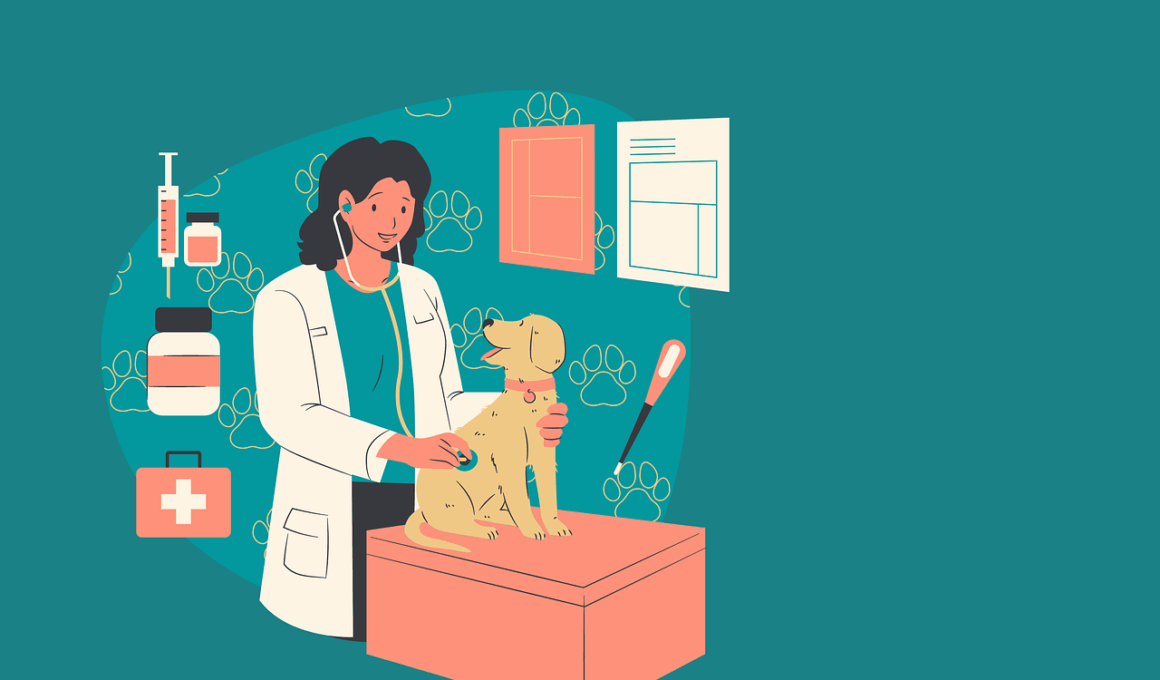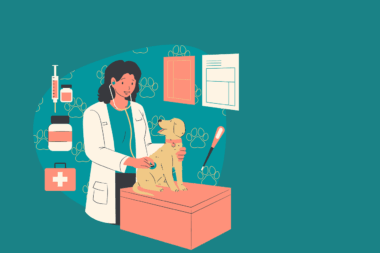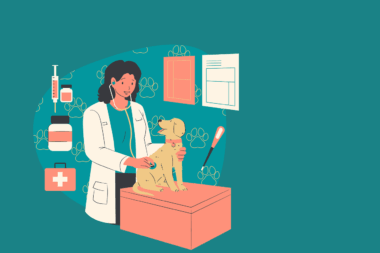Understanding Breed-Specific Health Conditions for Dog Shows
Participating in dog shows requires not only skill but also an understanding of breed-specific health conditions. Each breed has its unique set of health concerns that potential dog show competitors should be aware of. Responsible owners must prioritize the well-being of their pets and ensure that they are in optimal health before entering shows. Common breed-related health issues can include respiratory problems in brachycephalic breeds, hip dysplasia in larger dogs, and skin conditions in those with specific coat types. Maintaining a healthy diet is essential, but additional preventive care is also vital to keep your dog in shape for competition. Regular veterinary check-ups are crucial to monitor any breed-specific issues that may arise and to catch any potential problems early. Keeping records of your dog’s health, including vaccination status, weight, and health history, can be beneficial for both you and the show organizers. Knowing your breed’s specific needs not only improves your dog’s health but also increases the chances of a successful showing. Always consult with veterinarians to ensure adherence to health requirements necessary for competing effectively.
Each dog show has its health requirements, and these can greatly influence the overall success of your dog in the competition. It’s imperative to review the rules of the particular dog show you plan to enter to understand the specific regulations regarding health checks and documentation. In many cases, some shows may require dogs to undergo specific examinations, like eye checks or heart tests, particularly for breeds known for specific ailments. Submitting all necessary health certificates with your show entry helps to avoid any last-minute complications. Some breeds may also have restrictions based on their hereditary conditions, ensuring they do not contribute to unhealthy breeding practices. Additionally, vaccination records are typically required, and these should be up-to-date. If you are unsure about any requirements, reaching out to the show organizers can provide clarity and guidance. Thorough preparation regarding health conditions and requirements not only ensures compliance but demonstrates your commitment to responsible dog ownership. This preparedness reflects positively on both you and your breed, fostering a more healthy competition environment among participants and their beloved pets.
Common Health Issues In Breeds Participating in Dog Shows
Identifying common health issues in breeds participating in dog shows can aid owners in preparing their dogs for competition. Brachycephalic dogs, such as Bulldogs and Pugs, often face respiratory issues due to their unique skull shape. Owners must recognize symptoms like labored breathing, which can hinder performance and overall health. Likewise, larger breeds, including German Shepherds and Golden Retrievers, are frequently afflicted with hip dysplasia, a condition that may cause joint issues later in life. Choosing a reputable breeder can help minimize these risks, and responsible breeding practices often target these issues with health screenings. Small dogs can also experience dental problems, and maintaining good oral hygiene is crucial for their health. It’s essential to be observant and responsive to your dog’s health, keeping a daily lookout for any behavioral changes or signs of stress. Regular visits to the veterinarian, especially focusing on breed-specific issues, can be beneficial. Making adjustments to diet, exercise, and conditioning will also contribute to ensuring your dog remains competitive and healthy during shows, creating a more enjoyable experience for both handler and canine.
Nutrition plays a pivotal role in maintaining your dog’s health, especially when preparing for dog shows. You’ll want to focus on providing high-quality dog food that meets the nutritional requirements for your dog’s specific breed. Depending on age, activity level, and overall health, your dog may require different levels of protein, fat, and fiber. Consult with a veterinarian or a pet nutritionist who can guide you in establishing an appropriate diet. Supplements may be necessary for some breeds prone to specific deficiencies. Monitoring the weight of your dog is also crucial; being either overweight or underweight can impact their performance in shows. Training and exercise routines should be adapted to complement dietary changes, fostering fitness and stamina. Additionally, hydration must be ensured, particularly in breeds that are prone to overheating. Regular training sessions that combine physical activity with mental stimulation are ideal for dogs preparing for competitions. Understanding how nutrition influences performance can provide a competitive edge, enhancing your dog’s chances of success at shows and promoting long-term health and vitality among those participating.
The Importance of Regular Veterinary Check-Ups
Regular veterinary check-ups should not be overlooked when preparing for dog shows, as they can be essential for maintaining your dog’s health. These visits help in screening for any breed-specific conditions that might otherwise go unnoticed. Vets can also provide necessary vaccinations and ensure that your documentation meets show requirements. It’s advisable to establish a routine check-up schedule well ahead of the competition season to address any arising health issues. During these visits, you can discuss dietary changes, health management strategies, and any special requirements your breed may have. Additionally, veterinarians can suggest preventative measures to help maintain your dog’s health, keeping them in optimal condition as the show date approaches. Regular examinations allow for thorough assessments of your dog’s weight, skin conditions, and dental health, vital for any show dog. Being proactive with health care gets your dog ready for the rigors of a competition while offering peace of mind for owners. It’s a partnership that deeply cares for your dog’s welfare, ensuring both the competitor and pet are duly prepared for what lies ahead.
Socializing with other dogs and participating in various training sessions can also bolster your dog’s health and performance during shows. Exposure to different environments and situations helps build confidence and reduces stress during competitions. Engaging your dog in classes or exercises with peers will provide essential learning experiences while fostering a sense of camaraderie. Such social interaction can ease anxiety, as your dog becomes familiar with large crowds, loud noises, and other stimuli common at dog shows. Adjusting to these factors leads to smoother performance on the day of the event. Additionally, group training can pinpoint areas of improvement, allowing for focused efforts in training sessions tailored to specific health concerns. Keeping balance in training regimens with socialization ensures mental and physical wellness, reflecting the commitment to overall health. Many dog shows also offer specialty classes focusing on specific breed characteristics, which can be beneficial. As dogs learn to navigate these various environments, they become more relaxed and effective performers, showcasing the best of their capabilities to judges. Overall, socialization plays a crucial role, enhancing both health and the dog show experience.
Conclusion and Future Steps
In conclusion, understanding breed-specific health conditions for dog shows is vital for responsible ownership and successful competition. Owners must prioritize their dog’s well-being, embracing regular veterinary care, proper nutrition, and appropriate training methods. Awareness of common health issues within specific breeds ensures that participants can prepare adequately and adhere to show requirements. Enhance your dog’s competitive edge through proactive health management and adaptability to various situations during training. Combining these practices results in not only a healthier dog but a more rewarding dog show experience overall. As you move forward, stay committed to learning about your breed’s unique traits, both physically and mentally. Engaging with breed-specific clubs or organizations fosters continued education and support for both owners and dogs. Additionally, networking with fellow competitors provides chances to share experiences and advice, further building upon your knowledge. Ultimately, these interactions enrich your understanding, elevating both your dog’s health and performance at shows. Let this journey of preparation become rewarding and enlightening for both you and your beloved pet, facilitating a future filled with potential accomplishments in dog shows.
Lastly, always keep abreast of evolving health recommendations concerning dog show participation, as guidelines can frequently change. Staying informed about the latest health research and trends for your specific breed can significantly boost your success in competitions. Regularly check reputable breed association sites or veterinary resources to stay updated. This proactive approach ensures that you remain aware of any emerging health issues within breeds. Educating yourself empowers you to make sound decisions regarding your dog’s care and preparation, navigating the competitive landscape with confidence. The world of dog shows is indeed competitive, yet with the right knowledge and preparation, your dog can finish confidently, shining a light on its unique qualities. Investing time into your dog’s health and well-being is not just a requirement for dog shows but an ongoing commitment to being a responsible pet owner. No achievement is worth sacrificing the health and happiness of your beloved companion. Therefore, always prioritize your dog’s health alongside their performance goals, creating a harmonious balance that benefits both participants in the worlds of competition and companionship.





